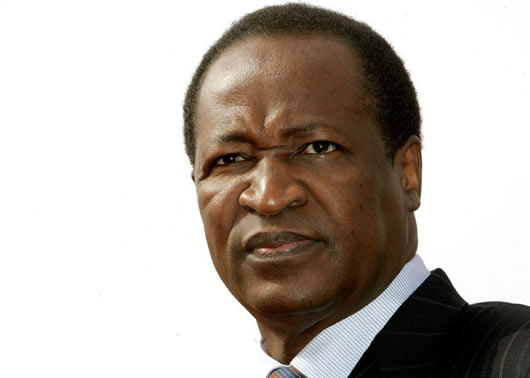
Blaise Compaore
The Economic Community of West African States (ECOWAS) has decided to extend next Thursday’s special summit on the Ebola virus disease for another day to tackle the political situation in Burkina Faso.
The ECOWAS Chairman, President John Dramani Mahama, made this known when he held discussions with a joint delegation from the United Nations, the African Union (AU) and the ECOWAS Secretariat at the Flagstaff House in Accra yesterday.
The delegation included the AU Commissioner for Political Affairs, Madam Aisha Abdullahi, and the Executive Secretary of the ECOWAS Secretariat, Mr Kadre Desire Ouedraogo.
Led by the UN Secretary-General’s Special Representative to South Sudan, Dr Mohammed Ibn Chambas, the delegation briefed the President on developments in Burkina Faso.
Tense situation
Burkina Faso remained tense as of yesterday after the resignation of President Blaise Campaore last Thursday.
Yesterday afternoon soldiers reportedly fired volleys of gunshots to disperse thousands of people who were protesting the military takeover of the country.
The protestors said it was wrong for the soldiers to hijack a revolution successfully executed by civilians.
Campaore in Cote d’Ivoire
President Campaore, who ruled Burkina Faso for 27 years, fled to Cote d’Ivoire last Friday after hundreds of his countrymen and women staged massive demonstrations calling for his resignation.
The protestors were against the Burkinabe leader’s attempts to massage the constitution to allow him to contest next year’s presidential election.
In the midst of the confusion, the UN Chief, Mr Ban Ki-moon, sent Dr Chambas to Ouagadougou to assess the situation.
Briefing
Briefing journalists after the 45-minute meeting at the Flagstaff House, the Minister of Foreign Affairs and Regional Integration, Ms Hannah Tetteh, said ECOWAS would use the special summit to reach consensus on the establishment of a transitional team to oversee the next elections in Burkina Faso within the constitutionally mandated period.
That, she said, would mean getting the stakeholders to agree to allow the national constitution to work in the current difficult period.
“It is our hope that by the time the ECOWAS meeting is over, some measure of consensus would have been reached in order to have clarity on the transitional arrangements and the way forward,” she said.
Ms Tetteh admitted that in situations as pertained in Burkina Faso, there was likely to be tension. However, what was important was how to deal with it within the confines of the law.
In that regard, she said, the question of any military takeover would be out of the equation.
“Within the AU Charter and the ECOWAS framework, military governments are not recognised,” she said, adding that where there was a military takeover, the consequences would follow.
Source: Daily Graphic























